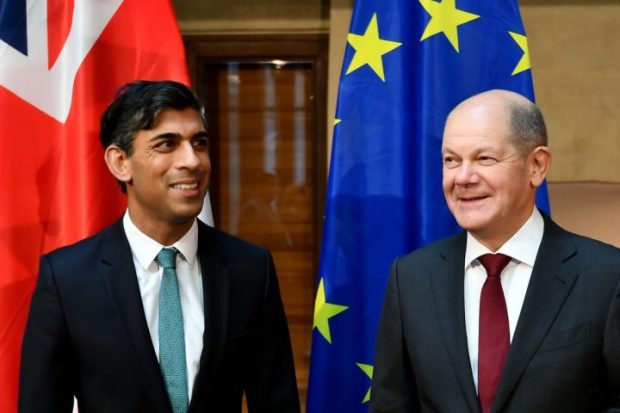An iron curtain has descended on Europe, and once again, it goes right through the middle of Germany. The average national infection rate is currently exploding, but the real story is not the average, but the vast gap between east and west, with another gap between the north and south. The north-west of Germany is like the rest of the western EU, cases growing but not at such an alarming rate. But the south-east is like central and eastern Europe. Hospitals are overflowing. Berlin has ceased all non-emergency operations. Germany’s formidable and numerous intensive care units are now for the first time in the pandemic experiencing bottlenecks, for which they have made no emergency planning.
The politics behind this is potentially quite dangerous. Markus Söder and Winfried Kretschmann, the state premiers of Bavaria and Baden-Wuerttemberg, came out yesterday with a demand for obligatory vaccination. Angela Merkel’s spokesman said immediately that this was an issue that she would happily pass on to Olaf Scholz and his coalition. The only political parties who are dead set against compulsory vaccination are the AfD and the FDP, the latter being a member of the incoming traffic light coalition. The FDP is also opposed, as a matter of principle, to nationwide lockdowns.
It is not hard to foresee that Covid will overshadow the new coalition’s agenda and drive a wedge between the parties right from the start. Scholz can hardly fall back into grand coalition mode and stitch up legislation with the opposition CDU. However, he will need their votes for any legislative changes, including lockdown and vaccination rules. A plausible result of these interlocking dependencies is paralysis, and recriminations within the coalition, and across the political spectrum. It is not hard to see a scenario in which the only winner from this mess is the AfD, which is anti-lockdown and anti-compulsion — and in opposition.
One of the notable statistics is that vaccination rates are particularly low in the AfD strongholds of eastern Germany. Low vaccination rates are likely linked to distrust of state actors: politicians, but also health officials and scientists. Opinion polls show that the German public is divided over compulsory vaccination. A narrow majority seems to be in favour, but this number needs to be interpreted carefully. There is an effect at work similar to that of Brexit. Those who are opposed to compulsory vaccination feel more strongly about it than those in favour. You may think of compulsory vaccination as an easy way out of the crisis, but this will come at the price of solidifying support for the AfD beyond the usual anti-immigration crowd. This support may not disappear once the pandemic finally recedes.
Another political consequence is that it would cement the internal divisions of the CDU, which is split between a pro-Merkel wing, with strongholds in the suburban areas of west Germany, and a conservative wing with strongholds in rural areas across the country and through the east, in both urban and rural areas. The CDU will likely swing to the right in the upcoming leadership election. Friedrich Merz has a good chance of winning the contest against his more liberal opponents. The election is decided by members, not officials that tend to be loyal to Merkel.
A minor, but still noteworthy political consequence of recent events is that a once-promising political career has collapsed in the last few days: that of Jens Spahn, the health minister. Spahn’s ministry is responsible for two messed-up vaccination campaigns in less than a year. His latest and probably last foolish act has been to announce a temporary stop to the procurement of the domestic Pfizer jab, and to use up existing stocks of Moderna at a time when the booster campaign is failing to come off the ground. Germans are broadly pro-vaccination, but they’re less inclined to mix their jabs. There are logistical reasons that might explain this move, yet the impact it has on the sagging booster shot campaign is devastating.
This article was first published in the EuroIntelligence morning briefing. For a trial subscription click here.
Got something to add? Join the discussion and comment below.
Get 10 issues for just $10
Subscribe to The Spectator Australia today for the next 10 magazine issues, plus full online access, for just $10.





















Comments
Don't miss out
Join the conversation with other Spectator Australia readers. Subscribe to leave a comment.
SUBSCRIBEAlready a subscriber? Log in